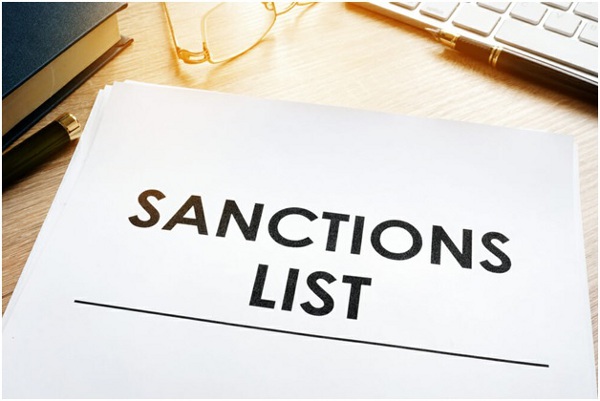Sanction checks are also called sanctions screening and they are a process used to screen individuals and businesses against different sanctions lists given out by governments, international organizations, and regulatory bodies. These lists have names of people who are on the sanction list or have been involved in crimes in the past.
Sanction verifications encapsulate pivotal methodologies executed by establishments to ascertain attachment with regulatory mandates and sidestep interactions with prohibited persons or entities. In the contemporary interconnected economy, where enterprises traverse borders, observance of constrictions statutes assumes heightened significance.
The main purpose of doing sanction list screening is that they help businesses stay safe from working with people or businesses that are sanctioned. By doing so they are able to put away risk and save themselves from punishments that are reputational damage.
Sanctions screening checks protect the reputation of organizations and make them credible in the eyes of people. As the world we live in is very advanced, all sorts of news spread very quickly. If an organization is found working with a sanctioned person, this will damage the standing and the news will spread within seconds.
When an organization does not perform sanction screening it puts itself at risk. If it breaks any rule it will have to face fines and punishments. The business can also be put on the sanction list. They lose the trust of clients and investors and also miss many opportunities.
Note: Sanctions screening can secure your transactions and save you from fraud. Learn how you can secure your money.
Understanding the Importance of Sanctions Compliance
Financial Implications
Deviation from constraints statutes can incur substantial monetary penalties and tarnish the standing of enterprises. Sanctions levied by regulatory authorities for transgressions can amass to staggering sums, significantly impacting the fiscal well-being of an establishment.
Legal Ramifications
Apart from fiscal repercussions, non-conformance with constraints statutes can engender legal entanglements, encompassing litigation and criminal accusations against implicated individuals or entities. These judicial repercussions can besmirch the reputation of the establishment and its principal stakeholders.
Common Challenges in Implementing Sanctions Checks
Lack of Awareness
Numerous establishments grapple with a dearth of cognizance regarding constraints statutes and their repercussions. Personnel may possess incomplete comprehension of the gravity of constraints conformity or the protocols requisite for adherence, culminating in inadvertent transgressions.
Resource Restraints
Constrained resources, both monetary and human, present formidable obstacles in executing efficacious constraints verifications. Small and medium-sized enterprises (SMEs) frequently lack the financial means to invest in sophisticated compliance frameworks, whereas larger corporations may encounter impediments in apportioning adequate personnel to oversee compliance endeavors.
Technological Constraints
Obsolete or inadequate technological infrastructures can impede the efficacy of constraints verifications. Manual screening procedures are time-intensive and susceptible to errors, whereas antiquated systems may lack the capacity to accurately identify proscribed individuals or entities.
Four Effective Ways to Implement Sanctions Checks
Utilizing Automated Screening Tools
Automated screening instruments harness advanced algorithms to swiftly and accurately pinpoint proscribed individuals or entities. These instruments can scour copious volumes of data from diverse sources, including governmental watchlists and sanctions rosters, to flag potential matches in real-time.
Conducting Periodic Training and Awareness Initiatives
Educating personnel about constraints statutes and the significance of conformity is imperative for efficacious implementation. Periodic training sessions and awareness initiatives can bolster cognizance among staff members and ensure comprehension of their duties in adhering to constraints verifications.
How Can Businesses Implement Effective Sanction Checks?
- Use Detailed Sanctions Screening Solutions: Put your money in advanced technologies that have access to updated sanctions lists.
- Implement Risk-Based Approach: Customize your sanction screening processes to make sure they align with the risk profiles of your business and industry.
- Conduct Ongoing Monitoring: Continuously monitor the people and lists to see if there are any changes. Update your screening data sets to make sure you comply with the most recent requirements.
- Employee Training and Awareness: Provide training to your staff and provide them with awareness related to sanction screening.
Combat financial crime with effective sanctions screening services, read the blog and take your notes!
Employee Education and Consciousness:
Provide comprehensive instruction to staff involved in client enlistment, transactional processing, and compliance duties. Guarantee their grasp of the significance of sanctions compliance, adeptness in utilizing scrutiny tools efficiently, and awareness of telltale signs hinting at violations of sanctions. Regularly update instructional materials to mirror statutory revisions and optimal methodologies, and nurture a culture of compliance across the organization.
HSBC and the Iranian Sanctions Case
HSBC is a bank that operates around the world. It has several branches in the US and many other countries. The US government had put restrictions on organizations to work with Iran as it was involved in building nuclear weapons and was in some way also supporting terrorist activities. HSBC did not pay any attention to these rules and continued doing business with Iran.
By 2007, its branch in the US made transactions of over $8.8 billion and broke the sanctions put by the US. They even hid the transaction messages so they could bypass the filters and continue working.
Some people working at HSBC and the US government told the regulators about HSBC breaking the sanctions. The US Department of Justice (DOJ) found out that HSBC’s systems were not efficient enough.
In 2012, HSBC came to an agreement with the DOJ and paid a fine of $1.9 billion. A part of this amount was for the profits they made by breaking the rules and the rest was a fine.
Want to know the different types of sanctions, read this blog to find out.
Does Your Business Need Sanctions Checks?
Sanction list checks are important for organizations to avoid getting into trouble with the law and harming their reputation. By using sanction screening and new technologies, organizations can improve the way they follow the rules and make sure that individuals as well as investors continue to trust them.
Now that you know what a sanction check is, stop wasting time and allowing criminals to enter your system. Visit AML Watcher and learn how you can improve your defense system.




















